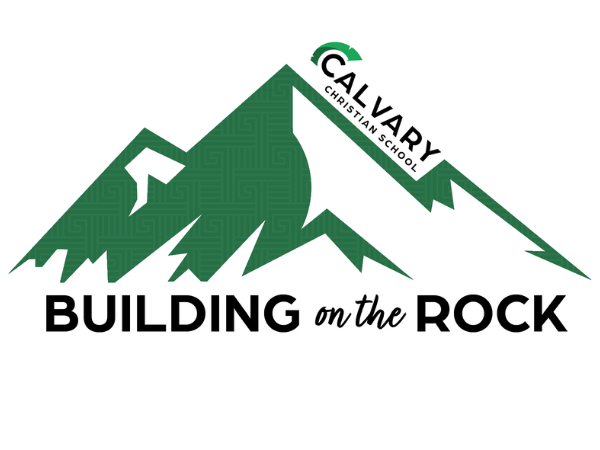The Spartan Blog
Spiritual Formation Starts at Home: The Role of Parents in Discipleship

At Calvary Christian School, we believe spiritual formation begins long before a child steps into the classroom. It starts in the home, where parents are called to be the primary spiritual guides for their children. The Bible clearly emphasizes the responsibility parents have to disciple their kids, nurturing them to grow in faith, wisdom, and love for the Lord.
Biblical Foundations for Parental Discipleship
In Deuteronomy 5, Moses is given the ten commandments and in the following chapter, God commands us to keep His law and Word always before us, saying, "These commandments that I give you today are to be on your hearts. Impress them on your children. Talk about them when you sit at home and when you walk along the road, when you lie down and when you get up."
This passage reminds me that discipleship is not a one-time event but an ongoing process that is supposed to be a part of daily life. Parents should see the opportunity to use conversations at the dinner table, bedtime routine, time spent hanging around McKinley Fields, to share God’s truth and model a Christ-centered life. This doesn’t have to be a sermon! It can be as simple as recognizing the beautiful day that God has given us or being thankful for the health and energy we have to run around a soccer field.
Similarly, Ephesians 6:4 speaks directly to fathers, urging them to take an active role:
"Fathers, do not provoke your children to anger, but bring them up in the discipline and instruction of the Lord."
This verse is one that highlights the unique role of fathers in shaping the spiritual direction of their children. Research supports this biblical truth. Studies show that when fathers take the lead in spiritual matters, the impact on their children’s faith is profound. In families where the father is a committed Christian and actively leads in faith, approximately 75% (and maybe even a higher number depending on which study you look at) of the children continue to walk with the Lord into adulthood. This is compared to only about 15% when the father is disengaged spiritually. Wow! A 60% increase simply from the father taking an active role in their child’s spiritual development? What an opportunity!
Practical Steps for Parents
So how can parents, especially fathers, actively disciple their children at home? Here are a few practical ideas: This does not have to be intimidating!
Family Devotions: Set aside time each day to read Scripture together, discuss its meaning, and pray as a family. This could be a morning ritual, during dinner, or before bedtime. Our staff have added monthly devotional plans your family can use in the Calvary app if you aren’t sure where to start. You’ll be able to find annual plans and monthly devotional plans that we recommend.
Model Prayer: Pray regularly with your children! Not just in times of need, but in moments of gratitude and joy. Let them hear you pray for them, their futures, and God’s guidance in their lives.
Intentional Conversations: Use everyday moments to point back to God’s truth. Whether it’s discussing a challenge at school or talking about current events, lead the conversation toward a biblical perspective.
Church Involvement: Regular church attendance as a family is crucial. Show your children the importance of being part of a community of believers, and serve together in your church. From time to time, we’ll hear frustrations about church, which may include serving with challenging people, disagreements over a church policy, or differences in preferred style of worship. The main point here is that the church has been established by God as His way for us to be connected and further our walk with Him. It’s simply our job to be obedient to scripture!
Personal Growth: The most powerful way to disciple your children is to live out your own faith authentically. Children will see this!
Partnering with Parents
At Calvary Christian School, we understand the vital role parents play in the spiritual formation of their children, and we want you to understand it too! Our goal is to come alongside you, provide biblical instruction, support for your home, a nurturing environment, and a Christian community to reinforce the biblical values taught at home. As parents, you have the primary role to disciple your children. We are passionate about seeing young minds turned towards Jesus as they grow not only in academic areas but more importantly in their walk with the Lord. People often talk about future society with fear, frequently worried about the direction the world is heading. We can say on the flipside that we see 500 students currently being rooted in God’s Word every day and will someday soon take that light to Logan county, our state, and our country to shine brightly for Jesus, impacting those around them as well. Now that’s an exciting future!
Why is Worldview so Important Anyways? A look at our Portrait of a Graduate: Biblical Worldview

It’s a sad story that we’ve heard too frequently. A young person who grew up in a Christian home attends a public university or community college and 4 short years later returns home with a completely different thought process and approach to the world around them. The biblical foundation that had been nurtured at home has been under constant attack while secular philosophies have taken its place. It’s for this reason that it’s so crucial for students to take their time in K-12 education to develop a deeply rooted Biblical approach to the world around us.
So let’s start by taking a brief look at eight of the secular philosophies that surround us today.
Humanism: Humanism is a philosophy that places human beings at the center of meaning and morality. Humanists believe that human beings are capable of morality and self-fulfillment without relying on divine intervention or religious doctrines.
Relativism: Relativism teaches that truth and morality are subjective and can vary based on culture, personal experience, or individual belief. According to relativism, there is no absolute right or wrong; what is considered moral or true depends on individual or societal preferences. This philosophy is often seen in statements like "what’s true for you may not be true for me." (Does this sound like the time of the Judges? They did what was right in their own eyes!)
Materialism: Materialism is the belief that the physical world is the only reality, and anything that exists must be measurable by scientific means. It denies the existence of anything spiritual or supernatural. This worldview often reduces human experiences like consciousness, emotions, and morality to mere chemical or physical processes in the brain.
Naturalism: Closely related to materialism, naturalism holds that everything can be explained by natural causes and laws, without the need for supernatural explanations. In education and science, naturalism often promotes a strictly evolutionary, non-theistic view of the world, rejecting any spiritual or divine aspects of reality.
Postmodernism: Postmodernism argues that there is no single, overarching truth or narrative that can explain reality. Instead, it promotes skepticism of any universal truths, favoring multiple perspectives and interpretations. Postmodernists often challenge traditional beliefs, including religious and moral absolutes, and advocate for deconstructing established narratives.
Secularism: Secularism is the principle of separating religion from civic affairs and government. While this can refer to maintaining religious neutrality in public institutions, it also has evolved into a worldview that prioritizes human reason and empirical science over religious or spiritual considerations, particularly in public policy, education, and culture.
Existentialism: Existentialism focuses on individual freedom, choice, and personal responsibility. It teaches that life has no inherent meaning, and it’s up to each person to create their own meaning through their choices and actions. While existentialism can be either religious or secular, the secular version tends to emphasize human autonomy without divine purpose or guidance.
Hedonism: Hedonism is the belief that pleasure or personal happiness is the highest good and ultimate aim in life.
Whether you’ve recognized it or not, the above philosophies are ingrained into different aspects of the secular thought process in our society, especially education. This highlights the importance of building a biblical worldview!
So what then defines a biblical worldview? A biblical worldview is a way of interpreting and understanding the world through the lens of Scripture. It is based on the belief that the Bible is the infallible, inspired Word of God and serves as the ultimate authority for truth, morality, and the nature of reality. This worldview sees all aspects of life through the principles and teachings found in the Bible.
Key components of a biblical worldview include:
God as Creator and Sovereign: A biblical worldview starts with the belief that God is the Creator of the universe (Genesis 1:1) and has ultimate authority over all creation (Psalm 24:1). He sustains and governs everything, and nothing happens outside of His will and purpose.
Humanity's Purpose: Humans are created in the image of God (Genesis 1:27) with inherent dignity and value. Our primary purpose is to glorify God and enjoy a relationship with Him (Isaiah 43:7). Life’s meaning is found in serving and loving God, not in personal fulfillment or earthly achievements.
The Fall and Sin: A biblical worldview recognizes that the world is fallen due to human sin (Romans 3:23). This fall has affected every aspect of creation, including human nature, relationships, and the environment. As a result, humanity is in need of redemption.
Jesus Christ as Savior: Central to a biblical worldview is the belief that salvation comes only through faith in Jesus Christ (John 14:6). Christ’s death and resurrection provide redemption from sin and offer the hope of eternal life (Romans 6:23). The gospel transforms lives, giving Christians new identities as children of God (2 Corinthians 5:17).
The Authority of Scripture: The Bible is the inspired and authoritative Word of God (2 Timothy 3:16-17). It provides guidance on how to live, think, and understand reality.
Moral Absolutes: A biblical worldview upholds that moral truths are objective and rooted in God’s nature and commands. Right and wrong are not subjective or relative but are defined by God’s standards (Exodus 20:1-17, Matthew 22:37-40).
Humanity's Role in the World: Christians are called to live as ambassadors of Christ in the world (2 Corinthians 5:20). This means engaging in culture, work, and relationships in a way that reflects God’s kingdom values and purpose.
Eternal Perspective: A biblical worldview includes an understanding that life on earth is temporary, and believers are to live with an eternal perspective (Colossians 3:1-2). The reality of heaven and Christ’s return shapes how we view suffering, success, and our ultimate purpose.
What a difference between the secular set of philosophies and a Biblical worldview! This is why at Calvary Christian School, one of the most vital characteristics in our Portrait of a Graduate is the commitment to developing a biblical worldview in our students. This goes beyond simply teaching them to follow rules or adhere to guidelines. Our goal is to nurture students who see the world through the lens of scripture with hearts that are truly transformed, reflecting a deep relationship with Christ, a change that only comes through the work of the Holy Spirit.
All forms of education are taught from a worldview, whether acknowledged or not. In public education, you’ll follow the top list to see the foundation for which the curriculum is built on, it will be grounded in humanism and relativism. In contrast, at Calvary Christian School, the foundation for everything we do is the only true cornerstone, the direct Word of God. We see science, history, and literature not as neutral subjects but as fields that reflect the beauty, order, and sovereignty of the Creator. Colossians 2:8 warns us, “See to it that no one takes you captive through hollow and deceptive philosophy, which depends on human tradition and the elemental spiritual forces of this world rather than on Christ.” We stand firm in teaching students to view the world around them through the truth of Scripture, enabling them to discern truth from falsehood.
Our commitment to a biblical worldview is foundational in developing graduates who are equipped not only to understand the world but to participate in it, with wisdom and conviction. These students have the ability to observe and engage with society through a filter that aligns with God’s Word. They are equipped to evaluate cultural, moral, and spiritual matters in light of biblical principles, which will guide their decisions and actions as they grow into adulthood.
In a world where secular values increasingly influence every aspect of life, our desire is to disciple students who see the world through a biblical lens, shaped by the truth of Scripture and led by the Holy Spirit. This vision for our graduates is not simply about academic success but about cultivating hearts that reflect Christ and minds that are fully anchored in His truth.
Developing Grit: Pursuing Calvary’s Portrait of a Graduate

Growth is a universal desire. We all want to see it in our lives and in our children’s lives. Yet, as we all know, growth never comes without struggle. It’s in the moments of challenge, frustration, and difficulty that growth occurs. Just as a seed pushes its way through the soil to reach sunlight, so too must we endure hardship to experience genuine growth.
The Science of Struggle: The Myelin Sheath
In the world of neuroscience, there’s a process that beautifully illustrates the necessity of struggle in growth. God designed our brains with billions of neurons that communicate with each other. These signals travel along pathways insulated by a substance we call the myelin sheath. The more we practice a skill, the thicker the myelin sheath becomes around the neural pathways, making the skill easier to perform. However, this process doesn’t happen overnight. It requires constant practice, repeated effort, and yes, struggle! Just as an athlete must endure hours of focused training to improve, our students must embrace grit to push through academic challenges to build the "myelin" that will enable them to master new skills. The apostle Paul gives us our motivation for our hard work in Colossians 3:23-24. He says to “work heartily, as for the Lord and not for men, knowing that from the Lord you will receive the inheritance as your reward. You are serving the Lord Christ.” Our desire for growth and skill development is ultimately a reflection of wanting to build the traits and talents that God has blessed us with; and we in turn want to use those abilities to glorify Him.
The Butterfly’s Struggle
Another example of grit producing transformational change in God’s creation is the butterfly. The caterpillar must fight its way out of the cocoon, struggling with all its might. We might be tempted to help, to break the cocoon and free the butterfly, but doing so would rob the butterfly of the strength it needs to fly. The struggle is necessary for its wings to develop the power required for flight. This beautifully represents the growth we want to see in our children. As much as we wish to remove their struggles, we must recognize that these very challenges are what prepare them for the future. The struggle is not a sign of failure but a critical part of their development.
Grit: Calvary’s Portrait of a Graduate
At Calvary Christian, one of the core characteristics in our "Portrait of a Graduate" is grit. Grit is the resolve to push through difficulties, to keep going when the going gets tough. This trait is not just about academic resilience; it’s about developing the character to persevere in faith, even when life’s challenges seem overwhelming. James 1:2-4 says, "Consider it pure joy, my brothers and sisters, whenever you face trials of many kinds, because you know that the testing of your faith produces perseverance. Let perseverance finish its work so that you may be mature and complete, not lacking anything."
Encouraging Families Through the Struggles
It’s important to remember that growth is a process, often marked by moments of difficulty. Here are three ways you can support your students as they encounter seasons of struggle:
Be Patient and Encouraging: Growth takes time! When your child is facing academic or personal challenges, remind them that it’s okay to struggle. Encourage them by celebrating small victories along the way. Galatians 6:9 reminds us, “Let us not become weary in doing good, for at the proper time we will reap a harvest if we do not give up.”
Model Perseverance: Our children learn more from our actions! When you encounter your own challenges, model perseverance and faith. Show them how you rely on God during tough times. Proverbs 3:5-6 says, “Trust in the Lord with all your heart and lean not on your own understanding; in all your ways submit to him, and he will make your paths straight.”
Pray Together: There is power in prayer! When struggles arise, take time to pray with your children. Ask God for strength, wisdom, and perseverance. Philippians 4:6-7 encourages us, “Do not be anxious about anything, but in every situation, by prayer and petition, with thanksgiving, present your requests to God. And the peace of God, which transcends all understanding, will guard your hearts and your minds in Christ Jesus.”
Partnering with Parents: Monitoring Social Media and Encouraging Family Time

As we continue our mission to disciple believers in Christ, we recognize our role in helping guide the whole family as we work towards the profile of a graduate. We know there are many challenges that our world presents in an attempt to minimize the effectiveness of biblical worldview development, so we must be vigilant and intentional in our efforts. In today’s digital age, the challenges of monitoring social media and online use have become more complex and critical than ever before.
The Impact of Screen Time and Social Media - Phil 4:8
The allure of screens and social media can be powerful. While technology offers numerous benefits, it also presents risks, particularly for young minds still learning to navigate the world. Excessive screen time has been linked to various issues, including decreased attention span, disrupted sleep patterns, and, as we’ve observed, increased anxiety and other mental health concerns. Social media, in particular, can foster unhealthy comparisons, expose children to inappropriate content, and detract from the face-to-face interactions essential for developing strong interpersonal skills.
As parents, it’s crucial to actively monitor and guide your children’s online activities. Setting limits on screen time is not just about reducing exposure to potentially harmful content; it’s about encouraging your child to engage in more meaningful, God-honoring experiences, both within the family and in their personal lives.
Encouraging Family Time
One of the most effective ways to counterbalance the influence of screens is to prioritize family time. Engaging in activities together, whether it’s sharing meals, playing games, or simply talking about the day, helps build stronger family bonds and provides your child with the needed connection.
Here are a few conversation starters you can use when your child comes home from school:
“What was the best part of your day today?” This question encourages your child to reflect on positive experiences.
“Did you learn something new or interesting in class today?” This helps them engage with what they’ve learned and share it with you.
“How did you spend your break times?” This can give you insight into how they interact with peers and use their free time.
“Did anything surprise or challenge you today?” Encouraging them to share challenges fosters resilience and problem-solving skills.
“What did you learn about God and His character today?” Encourage students to think about their lessons from the day and what they’ve learned about who God is.
These questions not only help you stay connected with your child’s daily life but also signal that you are interested and involved in their world, which can open the door to deeper conversations.
The Importance of Physical Activity and Personal Connection - 1 Cor. 6:19-20
In addition to monitoring screen time, it’s vital to emphasize the importance of physical activity in your child’s life. Regular exercise is not only essential for physical health but also plays a significant role in mental well-being. Whether it’s participating in sports, taking a walk together, or just playing outside, encouraging your child to be active helps reduce stress and anxiety while promoting a healthy lifestyle.
Moreover, personal connections are key to developing empathy, communication skills, and emotional intelligence. By fostering environments where your child can engage in real-world interaction; whether through family time, extracurricular activities, or social gatherings…you are helping them build the social skills they need to thrive!
Partnering Together for Our Children’s Future
At Calvary, we’re committed to partnering with you all as we seek to guide our students toward that picture of transformation in Jesus Christ. One small way we can do that is by taking proper precautions with social media and how we engage with those around us. Let us strive together each day to be ambassadors for Christ who are daily seeking to be more like Him!
Race to the Finish - Phase 2

What is going on at Calvary?
Tons! A lot! Where do I start??
Most of you know the history and story of Calvary. We are blessed to serve a growing body of families that desire a Christ-centered education for their children. Besides a growing family of Spartans, we’ve been working on other new realities, such as independence from our generous Church (Calvary Baptist), accreditation, School Choice for Ohio (Ed Choice Scholarships), added courses, athletics, and the “Building on the Rock” campaign to accommodate this growth! Miracles and stories abound – and I would love to tell you more if you are interested!
.png) You probably already know about our $9 million dollar project. By the way, we’d love to have you visit the building at mid-point in the construction phase for an open house on Sunday, May 19th, from 1:00 to 2:30. One of the things you will be able to do that day is write Bible Verses and/or prayers on the inner walls (on the studs that will be covered by drywall). This will be a good chance to cover this building in prayer, knowing that the mission and vision we are striving for is not easy, and we are praying for God’s favor and success.
You probably already know about our $9 million dollar project. By the way, we’d love to have you visit the building at mid-point in the construction phase for an open house on Sunday, May 19th, from 1:00 to 2:30. One of the things you will be able to do that day is write Bible Verses and/or prayers on the inner walls (on the studs that will be covered by drywall). This will be a good chance to cover this building in prayer, knowing that the mission and vision we are striving for is not easy, and we are praying for God’s favor and success.
We all know that this building, as excited as we all are about it, is only a tool to provide Christian Education and programs to as many kids and families as possible, as well as in an environment that is conducive to making good on the ideas around our Profile of a Calvary Graduate (the capacity of this building is 750)!
Financially – How is it going? What is still needed? Well, I am so glad that you asked!
So many miracles, so much of God's hand up to this point, but let me summarize it.
We are on a 38-acre parcel (CR-9) and we’ve been able to build 10,000 square feet so far (This was a 2.5M project). Soon after, we were able to secure a $6 million dollar loan from Middlefield bank to begin phase 2 of this campus project. We knew we would need another $1.5 million to get into the building and have all the needed items to run a flourishing school.
Drum roll – many have responded! If you go to our giving page, you will see our new/latest realities. To get into the building we need around $1.1 million and have more than $400,000, so we are in a place now that the ASK is down to under $700,000! I know, that’s still a lot of money!
Remember we are talking about a $12 million dollar campus project (and this is the same school that has a history of living in scarcity and debating if we would be able to open the following fall).
Yes, many have given and we are so thankful! But hear this call saying we are close and we need you! We believe this project will be a benefit to families in our community for decades to come! That a high quality Christian education with the required facilities to match will be available in Bellefontaine and serving families from a wide geographical range is exciting!
.png) This isn’t a guilt trip, just saying, we really do have the potential to knock this $700,000 need out of the ballpark. It is down to the items needed on the inside of the building. I am talking about gym floor, score boards, lockers, setting up rooms, office furniture, library, kitchen and many, many things that make up
This isn’t a guilt trip, just saying, we really do have the potential to knock this $700,000 need out of the ballpark. It is down to the items needed on the inside of the building. I am talking about gym floor, score boards, lockers, setting up rooms, office furniture, library, kitchen and many, many things that make up
The items needed for a “get it done” Christian School. We have a brochure that outlines many of these specific items. Our hope is that you may see a specific need and give it as you think about the way it will impact the students' daily lives here. And we really want to equip a new building with high quality items, but with the value-added of Christian discipleship and biblical worldview, make your contribution a plus, plus, plus!
This is a request for you to be givers to the Mission of Calvary Christian! But this is also a praise report. We could not be where we are without God and the army of believers (The Body of Christ) coming together. So, when I make the request, $700,000 dollars from 100, maybe 200 of you, I do so knowing that God has taken us this far. I have every belief that HE will help us to FINISH THE JOB!
And when I say, “Finish the Job,” I include the fact that we will have a mortgage of $6 million dollars. Again, it is a big number! But our plans and prayers are to attack that debt and get the school back to debt free as quickly as possible, so those funds can then be diverted to other avenues of improving the school! If our people give more than $700,000, then we can look at paying down the mortgage, or starting the work needed for Phase 3, which will include expanding our space and moving forward seriously in the development of our athletic fields and the facilities needed to support a top-notch athletic program.
We do sincerely hope that you’ll come to the Open House on the 19th. I know we will make more opportunities for you to visit along the way, but have joy with us in the progress. If you would like to talk more in specific and detail with me – I can talk your ear off!! Let’s set an appointment with dbragg@calvarybellefontaine.org), grab some coffee. I will show you around and update you on our progress and our challenges!
On another note, I want to assure you (another item of PRAISE) that while God is blessing us in regard to this building project, He is also blessing us in regard to the people He has called to Calvary. We will have nearly 70 employees this fall. No, they still do not make as much as the public-school counterparts, but we have increased compensation significantly. We know the team here is absolutely key to fulfilling the mission of Calvary Christian School.
A couple of amazing ways the Lord has recently provided. We have received several things for our kitchen at free or reduced prices. We have a teacher whose sister works for a company in Columbus who owns several big buildings, and they had a company that went bankrupt (not happy about that!) and left a significant amount of furniture (teachers' desks and tables) that we were able to pick up for free!
Also, we have a donor with a significant gift who said that as our givers give, he will match you (all) up to $100,000!!! So, what a time to begin giving to this project – your money doubles!!
Please – check out the list using the link below, consider how you might help Calvary finish this phase and enter this historical, “For Such a Time as This” moment!!
In His Grip,
Dr. Dan L Bragg, Ed-D
Asst. Head of School/Development
